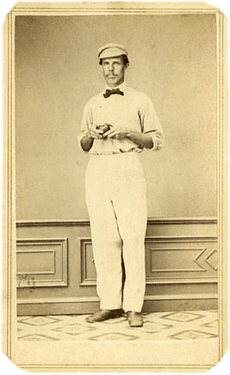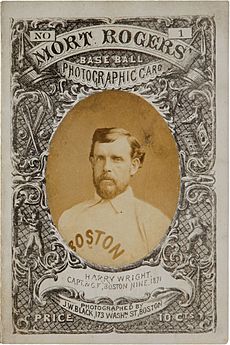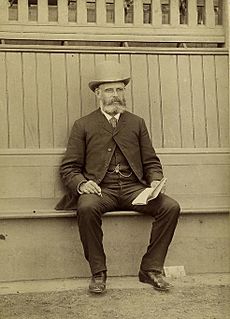Harry Wright facts for kids
Quick facts for kids Harry Wright |
|||
|---|---|---|---|
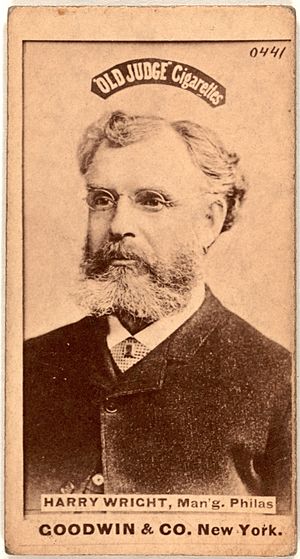 |
|||
| Center fielder/Manager | |||
| Born: January 10, 1835 Sheffield, England |
|||
| Died: October 3, 1895 (aged 60) Atlantic City, New Jersey |
|||
|
|||
| debut | |||
| May 5, 1871, for the Boston Red Stockings | |||
| Last appearance | |||
| September 29, 1877, for the Boston Red Caps | |||
| MLB statistics | |||
| Batting average | .272 | ||
| Hits | 222 | ||
| RBI | 111 | ||
| Managerial record | 1225–885–35 | ||
| Winning % | .581 | ||
| Teams | |||
|
|||
| Career highlights and awards | |||
|
|||
| Induction | 1953 | ||
| Vote | Veterans Committee | ||
William Henry "Harry" Wright (born January 10, 1835 – died October 3, 1895) was an amazing baseball player, manager, and a true pioneer of the game. He put together and led baseball's very first team where players were paid full-time, the 1869 Cincinnati Red Stockings. He also played center field for them!
Harry Wright was super smart about baseball. He came up with new ways to play, like having outfielders help out infielders and changing where players stood depending on who was batting. Because of all his great ideas and how much he helped baseball grow, he was put into the Baseball Hall of Fame in 1953. He also helped make baseball a real business by paying his players well, much more than most people earned back then.
Contents
Harry Wright's Early Life
Harry Wright was born in Sheffield, England. He was the oldest of five children. His dad, Samuel Wright Sr., was a professional cricket player. When Harry was almost three, his family moved to the U.S. His father found work at the St George's Cricket Club in New York.
Harry left school at age 14 to work for a jewelry company, even working at Tiffany's for several years. Both Harry and his younger brother, George, helped their father with cricket. Harry even played against the first English cricket team to visit America in 1859.
Both brothers also played baseball for top amateur teams. Harry joined the Knickerbocker Base Ball Club in 1857 when he was 22. He played his first game with them in 1858. In 1863, Harry joined the Gotham of New York team, mostly playing shortstop. His brother George was already on that team.
Time in Cincinnati
Harry Wright moved to Cincinnati in 1865 to work for the Union Cricket Club. When baseball became very popular in 1866, he became the main person in charge of the Cincinnati Base Ball Club. He was 31 by then.
In 1867, Cincinnati had a strong team. Wright was the regular pitcher, and the team won 16 games. They only lost to the Nationals of Washington, D.C. In 1868, he added more talented players to the team.
When baseball allowed professional players in 1869, Harry brought in even more new players. His brother George, who was one of the best players at the time, joined the team. George was the highest-paid player in Cincinnati. The team became known as the famous First Nine.
The Red Stockings traveled all over the country in 1869 and didn't lose a single game! They were likely the strongest team in 1870 too. However, the club stopped having professional baseball after that season.
What a Manager Did Back Then
In those early days, the rules of baseball didn't allow players to be swapped out during games easily. So, a team manager's job wasn't just about game strategy like today. They were more like a modern general manager. Their main jobs were to find and sign talented players, build a strong team, and teach them how to play well together through practice.
The Seventh-Inning Stretch
Did you know Harry Wright was the first person to write about the Seventh-inning stretch? He mentioned it in 1869 after watching a game.
Moving to Boston
The National Association Years
In 1870, Harry Wright was invited to manage the first baseball team in Boston, the "Boston Red Stockings". This team was going to play in a new league called the National Association of Professional Base Ball Players.
In their first year, the Boston Red Stockings finished third. Wright was 36 years old and one of the oldest players in the league. He played center fielder in most of the team's games. He also pitched in some games.
In 1872, the Red Stockings won their first championship! They won again in 1873. In 1874, Harry Wright stopped being a regular center fielder. He had been the oldest player in the league for three years. That year, he also tried to bring baseball to England, but it didn't go very well.
In 1875, the Red Stockings had an amazing season, winning 71 games and losing only 8! They finished way ahead of other teams. This was the last year for the National Association league.
The National League Years
In 1876, the Boston team joined the new National League. People started calling them the "Red Caps" because a new team in Cincinnati used the "Red Stockings" name. They didn't do so well in their first year in the new league, finishing fourth. But then, with Wright still leading them, they won two more championships in 1877 and 1878!
The team finished second in 1879. After that, they didn't do as well, finishing sixth in the next two seasons. These were Harry Wright's last two seasons in Boston.
After Boston
Time in Providence
After leaving the Red Caps, Wright quickly joined the Providence Grays, which was a strong team in the National League. In 1882, his first year as manager for the Grays, the team finished second. They were only three games behind the powerful Chicago White Stockings. The team finished third the next year, and then Wright moved on again.
While in Providence, Wright started the idea of a "farm team". He put together a team of amateur players. These players would play at the Messer Street Grounds when the main Grays team was away. The idea was that if a main player got hurt, they could easily find a replacement from these amateur players.
Leading in Philadelphia
In 1884, Harry Wright was hired to manage the new Philadelphia team. Philadelphia had joined the National League the year before and had a terrible record, winning only 17 games and losing 81. Under Wright, they got much better, winning 20 more games in 1884 and finishing sixth. In 1885, the team had a winning record for the first time, winning 56 games and losing 54. They finished third.
Philadelphia kept getting better under Wright in 1886, finishing with a record of 71 wins and 43 losses. In 1887, the team finished second, very close to winning the championship. Sadly, this was the best the team did under Wright in Philadelphia. From 1888 to 1893, the team usually finished in the middle of the league. Wright even missed a lot of the 1890 season because of problems with his eyesight.
During his time in Philadelphia, Wright often had disagreements with the team owners. After the 1893 season, his contract was not renewed. The National League, knowing how respected Wright was, offered him the job of Chief of Umpires. During his career, Wright often helped as an umpire, even for games with rival teams, because he was known for being very fair.
Managerial Record
In his 23 seasons as a manager in the National Association and National League, Harry Wright's teams won six league championships (1872–75, 1877, 1878). They finished second three other times and never finished lower than sixth place. Wright ended his managing career with 1225 wins and 885 losses, which is a great winning percentage of .581.
| Team | Year | Regular season | Postseason | |||||||
|---|---|---|---|---|---|---|---|---|---|---|
| Games | Won | Lost | Win % | Finish | Won | Lost | Win % | Result | ||
| BOS | 1871 | 31 | 20 | 10 | .667 | 3rd in NA | – | – | – | – |
| BOS | 1872 | 48 | 39 | 8 | .830 | 1st in NA | – | – | – | – |
| BOS | 1873 | 60 | 43 | 16 | .729 | 1st in NA | – | – | – | – |
| BOS | 1874 | 71 | 52 | 18 | .743 | 1st in NA | – | – | – | – |
| BOS | 1875 | 82 | 71 | 8 | .899 | 1st in NA | – | – | – | – |
| BOS | 1876 | 70 | 39 | 31 | .557 | 4th in NL | – | – | – | – |
| BOS | 1877 | 61 | 42 | 18 | .700 | 1st in NL | – | – | – | – |
| BOS | 1878 | 60 | 41 | 19 | .683 | 1st in NL | – | – | – | – |
| BOS | 1879 | 84 | 54 | 30 | .643 | 2nd in NL | – | – | – | – |
| BOS | 1880 | 86 | 40 | 44 | .476 | 6th in NL | – | – | – | – |
| BOS | 1881 | 83 | 38 | 45 | .458 | 6th in NL | – | – | – | – |
| PRO | 1882 | 84 | 52 | 32 | .619 | 2nd in NL | – | – | – | – |
| PRO | 1883 | 98 | 58 | 40 | .592 | 3rd in NL | – | – | – | – |
| PHI | 1884 | 113 | 39 | 73 | .348 | 6th in NL | – | – | – | – |
| PHI | 1885 | 111 | 56 | 54 | .509 | 3rd in NL | – | – | – | – |
| PHI | 1886 | 119 | 71 | 43 | .623 | 4th in NL | – | – | – | – |
| PHI | 1887 | 128 | 75 | 48 | .610 | 2nd in NL | – | – | – | – |
| PHI | 1888 | 132 | 69 | 61 | .531 | 3rd in NL | – | – | – | – |
| PHI | 1889 | 130 | 63 | 64 | .496 | 4th in NL | – | – | – | – |
| PHI | 1890 | 68 | 36 | 31 | .537 | 3rd in NL | – | – | – | – |
| PHI | 1891 | 138 | 68 | 69 | .496 | 4th in NL | – | – | – | – |
| PHI | 1892 | 77 | 46 | 30 | .605 | 3rd in NL | - | - | - | - |
| 78 | 41 | 36 | .532 | 5th in NL | - | - | - | - | ||
| PHI | 1893 | 133 | 72 | 57 | .558 | 4th in NL | – | – | – | – |
| Total | 2,145 | 1,225 | 885 | .581 | - | - | - | |||
Later Life and Legacy
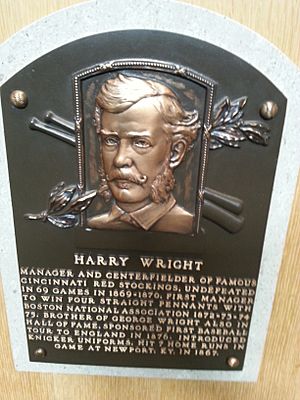
Harry Wright passed away from a lung illness on October 3, 1895, in Atlantic City, New Jersey. He is buried in West Laurel Hill Cemetery, in Bala Cynwyd, Pennsylvania.
Harry Wright was honored by being put into the Baseball Hall of Fame in 1953. He was also inducted into the Cincinnati Reds Hall of Fame in 2005. His brother George is also in both Halls of Fame. Another brother, Sam, also played baseball professionally.
Images for kids


